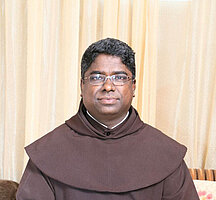Dr. Prasad Theruvathu, India

1. Please describe your (scientific) work/research in a short way.
NICHOLAS OF CUSA (1401-1464) was the philosopher of my research. DR. DR. ANDREAS SPEER was my Doktorvater. My scientific research was about the concept of “Ineffabilis in the Thought of Nicholas of Cusa”, the 15th Century German multi-talented philosopher, theologian, mathematician, astronomer, lawyer and Cardinal of the Roman Catholic Church.
Comprehending the incomprehensible and expressing the inexpressible was a life-task for Nicolas of Cusa, a tireless seeker of truth and hunter of wisdom. The perennial philosophical questions of knowing and expressing are central in Cusanus' thought. In Cusanus' philosophical and theological works one can find a peculiar coincidence between comprehension and incomprehension, effability and ineffability. Cusanus leads a seeker of truth from knowledge to learned ignorance and from speaking into divine silence.
In this book, I investigate Cusanus' concept of ineffabilis, the possibilities and the limits of human knowledge and language, and the necessity and the impossibility of naming something precisely. Cusanus' philosophy of ineffabilis is applied to the inter-cultural philosophy, especially to the field of dialogue between cultures and religions. Practical rules and conclusions are drawn for a successful dialogue between people of different cultures and religions, for the cause of unity and peace.
2. Which aspect of a sustainable life, work and research is especially relevant for you and why?
The most importance aspect of life on this planet is RELATIOSHIP (Vertical and horizontal). Human being is a relating animal. Relationship with oneself, God, human beings, animals, environment etc are few of the many dimensions of our dependent existence. DIALOGUE is the inevitable tool or modus operandi for relationship: dialogue between God and humans, between humans, between humans and animals, between humans and environment etc. Dialogue will enlighten our minds and lead the world to an integral renaissance i.e. spiritual, political, economic, educational and ecological renaissance.
Being an Indian and being in India, where there are 8 religions, which play a big role in sustainable life, we promote dialogue between religions. At present I serve as the Secretary of the “Commission for Ecumenism and Dialogue” of “KERALA CATHOLIC BISHOPS’ COUNCIL” (KCBC). Religious leaders are influential in the society and they take initiative for the integral renaissance.
3. What would be your wish for the future (and why) with this regard?
I dream a world where east and west, various religions and cultures, theists and atheists, scientists and theologians, philosophers and ordinary people, industrialists and politicians in dialogue, searching for the whole truth of our existence and work together for the dignified survival, welfare of humanity and our planet.
4. How is the Corona crisis affecting you in your every-day life and work?
Corona has affected my teaching pedagogy and environment: taking lesson online without direct contact. Since I am a monk, “lockdowns” and “social distancing” is part of my lifestyle. As a law-abiding citizen whenever I got out, I follow all the rules and regulations given by the Indian government, except the unacceptable insistence on vaccination. So far, I have not found any convincing reason for the present-day vaccination. I fear that the integral renaissance of which I dream could become extremely difficult in the present circumstances because the present trend shows signs of renaissance of a small club of elites of the world whose plan is to reset the world in an egocentric way for their own profit.


